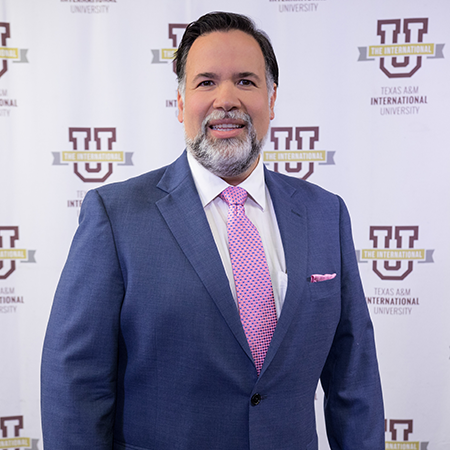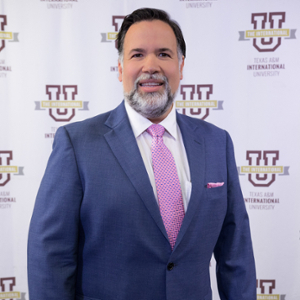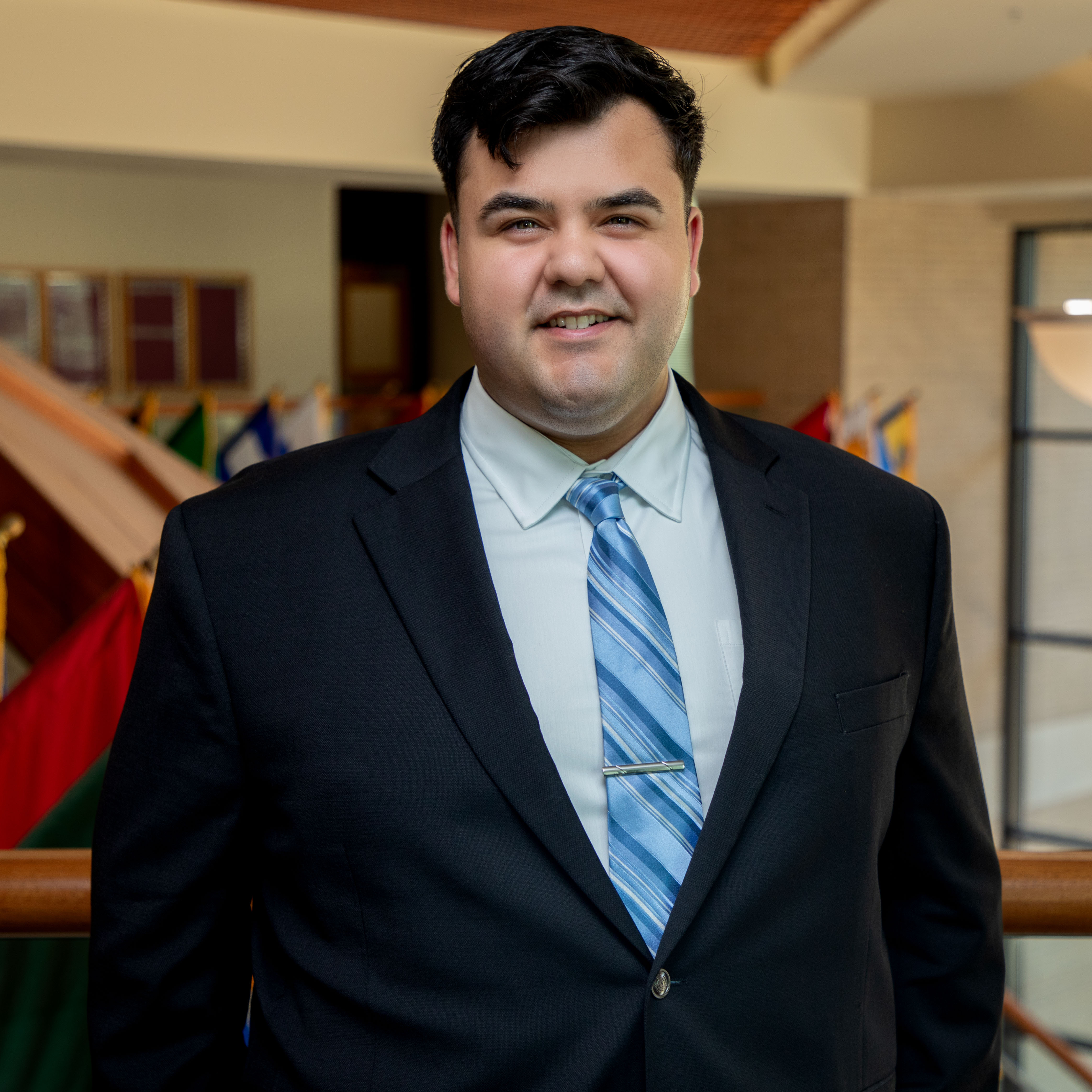TAMIU'S Dr. Covarrubias Addresses Cross-Border Innovation at Cali-Baja Business Summit 2025

Dr. Daniel Covarrubias, director of Texas A&M International University's (TAMIU) A.R. Sanchez, Jr. School of Business Texas Center for Border Economic and Enterprise Development (Texas Center), participated in the Cali-Baja Business Summit 2025 at the University of California San Diego's (UCSD) Institute of the Americas this week.
Speaking on the Smart Border Coalition Panel: Infrastructure for Global Competitiveness, Dr. Covarrubias shared insights from operational innovations along the Texas - México border, demonstrating the strategic importance of knowledge exchange across different U.S. - México border regions.
The Summit, organized by UCSD's Center for U.S. - Mexican Studies, the Smart Border Coalition, the Institute of the Americas, the San Diego Regional Chamber of Commerce, the Tijuana Economic Development Corporation (Tijuana EDC), and ITJ, among other organizations, brought together academics, business leaders, and policymakers to explore binational competitiveness and cross-border innovation.
The Smart Border Coalition panel featured Dr. Covarrubias alongside Mario Orso (chief executive officer, SANDAG), Jorge Goytortua (chief executive officer, CBX). It was co-moderated by Alejandra Mier y Terán(executive director, Otay Mesa Chamber of Commerce) and Joaquin Luken (executive director, Smart Border Coalition) and focused on the panelists’ expertise and insights on infrastructure development and cross-border coordination.
Dr. Covarrubias's participation reflects the growing importance of inter-regional border collaboration. As an expert on the U.S. - México border with extensive experience in the Laredo-Nuevo Laredo corridor, which handles over $330 billion in annual two-way trade, Dr. Covarrubias brought operational lessons and technological innovations to the San Diego-Tijuana discussion that can inform infrastructure modernization and policy development across all U.S. - México crossing points.
"What we're witnessing is the strategic importance of cross-border knowledge exchange, not just between the United States and México, but between different border regions themselves," said Dr. Covarrubias, “The Laredo-Nuevo Laredo corridor and the San Diego-Tijuana region each face unique challenges, but the operational lessons, technological applications, and institutional innovations we develop can inform each other. When Texas border experts collaborate with California border experts, when we compare what works at different crossing points, we accelerate innovation across the entire 2,000-mile border."
During the panel discussion, Dr. Covarrubias addressed questions about operational efficiency, binational coordination, and technological innovation. He shared insights from Laredo's experience with Unified Cargo Processing (UCP) programs and their need to evolve toward more integrated approaches. Dr. Covarrubias highlighted the Binational Customs Agency (BCA) proposal, a "one border, one process" framework he co-authored with Ambassador Gerónimo Gutiérrez Fernández and published through the U.S. - México Foundation, which builds on UCP's foundation to create side-by-side U.S. and Mexican Customs operations that enhance both security and efficiency.
Dr. Covarrubias introduced TAMIU's Texas Center Logistechs Living Lab to the Cali-Baja audience as a resource for expanding knowledge about emerging technologies in cross-border logistics. He described the Living Lab's signature sessions, which bring startup companies to present innovative technologies, A.I.-based solutions, digital twins, and Internet of Things (IoT) applications to the business community in an accessible format.
These sessions help logistics professionals, customs brokers, and border stakeholders learn about new technologies, understand their applications, and evaluate their potential for cross-border operations. Dr. Covarrubias emphasized the Living Lab's availability as a binational resource for knowledge exchange across all major North American trade corridors, including the Cali-Baja region.
"The next stage of North American competitiveness won't come from more lanes; it will come from better data, smarter coordination, and applied A.I. across our trade corridors," Dr. Covarrubias emphasized, "We must standardize cross-border processes before we digitize them, invest in operational transparency through real-time dashboards, and institutionalize binational coordination that survives political transitions. These aren't Laredo lessons or San Diego lessons; these are North American lessons."
The summit marked a strategic collaboration between three major academic institutions focused on U.S. - México relations and border economic development: UCSD's Center for U.S. - Mexican Studies, directed by Dr. Rafael Fernández; the Institute of the Americas at UCSD, led by Richard Kiy, and TAMIU's Texas Center for Border Economic and Enterprise Development. This institutional partnership enables a comprehensive, multi-regional perspective on border innovation, trade policy, and binational coordination.
"This collaboration between the Texas Center at TAMIU and the Center for U.S. - Mexican Studies at UCSD represents exactly the kind of academic partnership that strengthens our understanding of the entire U.S. - México border," Dr. Covarrubias noted, "When we bring together expertise from Texas and California, when we share research methodologies and operational insights, we develop a truly holistic view of North American economic integration. Border communities aren't just crossing points, they're innovation hubs, and our academic institutions must collaborate to document and accelerate that innovation."
Dr. Covarrubias also presented his "Why Not A.I." framework for logistics modernization, arguing that any task that is repetitive, data-rich, rules-based, or prediction-based should be automated through artificial intelligence. He identified specific applications the logistics industry can adopt: A.I. copilots for customs compliance, A.I.-based dispatching and optimization, A.I. customer service systems, A.I. risk models for shipment anomalies, and A.I.-assisted training for customs brokers and warehouse staff. He emphasized the future potential of synthetic data and digital twins to simulate entire cross-border logistics operations before physical implementation.
Dr. Covarrubias's insights at the Cali-Baja summit build on his extensive research documented in his recent book, "Navigating the New Era of U.S. - México Trade: Policy, Technology, and Border Innovation," and connect to TAMIU’s Sanchez School of Business Texas Center’s ongoing research on North American trade modernization. His participation comes as policymakers prepare for the 2026 USMCA review, making cross-border operational efficiency and technological innovation critical priorities for trilateral competitiveness.
The Cali-Baja Business Summit 2025 included executive talks from industry leaders across aerospace, medical devices, biotechnology, and advanced manufacturing, as well as sessions on entrepreneurship and binational innovation. The event concluded with the development of an Action Agenda 2026, outlining priorities for cross-border collaboration and regional competitiveness.
Dr. Covarrubias expressed his appreciation to Luken and Dr. Rafael Fernández for the invitation to participate. He also acknowledged the leadership of Adriana Eguia (president, Tijuana EDC) and Kurt Honold (secretary of economy and innovation of Baja California) in advancing the Summit's vision for a borderless economy.
For more about Dr. Covarrubias's work, the Texas Center's Logistechs Living Lab, or TAMIU's border innovation research initiatives, please visit http://texascenter.tamiu.edu, email Dr. Covarrubias at dcova@tamiu.edu, or call 956.326.2520.
TAMIU Registration for Wintermester and Spring 2026 is underway.
To learn more about TAMIU’s registration processes, visit the dedicated Registration Hub at https://go.tamiu.edu/registration .
For more, contact the Office of the University Registrar at 956.326.2250, email registrar@tamiu.edu, or visit offices in the Senator Judith Zaffirini Student Success Center, suite 121.
More of the University's story is available across its social channels on Facebook, Instagram, LinkedIn, X, and YouTube.
University news can also be found on its dedicated NewsHub.

